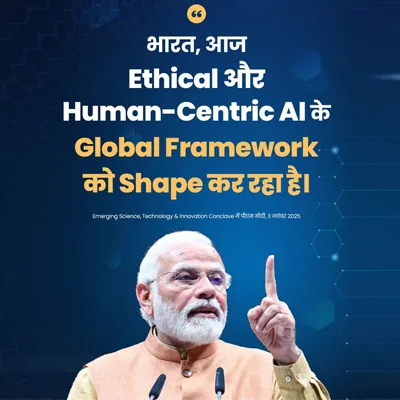Prime Minister Narendra Modi on Thursday inaugurated the Emerging Science, Technology and Innovation Conclave (ESTIC) 2025 at Bharat Mandapam, New Delhi, highlighting India’s growing prominence in science, technology, and innovation. Addressing scientists, innovators, academicians, and global delegates, he said the world increasingly views India as a key hub for innovation, powered by its vibrant democracy and rapid economic growth.
At the outset, the Prime Minister congratulated the Indian women’s cricket team for its historic ICC Women’s World Cup 2025 victory, calling it a proud moment for the nation that would inspire millions of young Indians.
He also hailed the successful launch of India’s heaviest communication satellite, congratulating ISRO and the country’s scientists for their achievement. Emphasising the importance of global cooperation in research and innovation, he said the Conclave reflected India’s vision of “science for global progress and innovation for all.”
Modi announced the Research, Development and Innovation Scheme with an allocation of Rs 1 trillion, aimed at scaling up India’s R&D capabilities. He said this was the first time such large-scale capital was being made available for high-risk, high-impact projects, including those in the private sector. “India is working to build a modern innovation ecosystem with a strong focus on improving the ease of doing research,” he said.
Highlighting India’s achievements, the Prime Minister said the country’s R&D expenditure has doubled over the past decade, the number of registered patents has grown 17-fold, and India has become the world’s third-largest startup ecosystem, with over 6,000 deep-tech startups focused on clean energy, semiconductors, and advanced materials. He also noted that India’s bio-economy had expanded from USD 10 billion in 2014 to nearly USD 140 billion today.
The Prime Minister underlined India’s progress in sunrise sectors such as green hydrogen, quantum computing, deep-sea research, and critical minerals, asserting that the country is now a pioneer of technology-driven transformation.
Reflecting on India’s success during the COVID-19 pandemic, he said the nation’s swift development of an indigenous vaccine and the execution of the world’s largest vaccination drive demonstrated India’s innovation strength. He credited this success to India’s Digital Public Infrastructure, which has connected over 200,000 gram panchayats through optical fibre and democratised access to mobile data.
Focusing on inclusivity, Modi emphasised that “when innovation is inclusive, beneficiaries become leaders.” He cited the increasing participation of Indian women in science and technology, noting that women now make up 43 per cent of STEM enrolments, exceeding the global average. The number of patents filed by women has surged from under 100 a decade ago to over 5,000 annually.
The Prime Minister also announced the establishment of 25,000 new Atal Tinkering Labs to nurture creativity among students, adding to the 10,000 labs already operational across India. He further stated that 10,000 new Prime Minister’s Research Fellowships will be awarded over the next five years to boost research talent.
Speaking about the India AI Mission, he revealed an investment of over Rs 100 billion to ensure that Artificial Intelligence remains ethical, inclusive, and human-centric. He also announced that India will host the Global AI Summit in February 2026, aimed at creating a global framework for responsible AI governance.
The Prime Minister called for a national focus on nutrition security, biofortified crops, soil health, clean energy storage, and genomic research, stressing that India must achieve self-reliance in critical inputs where it remains dependent on global supply chains.
Concluding his address, Modi said, “When science scales, innovation becomes inclusive, and technology drives transformation.” He urged the scientific community to chart a collective roadmap for India’s innovation journey, reaffirming the government’s full commitment to funding research and supporting visionary ideas.
He ended with a rousing invocation of “Jai Vigyan, Jai Anusandhan” (Hail Science, Hail Research), expressing confidence that ESTIC 2025 would propel India to new heights in global innovation leadership.
The event was attended by Union Minister Dr Jitendra Singh, Principal Scientific Adviser Prof Ajay Kumar Sood, Nobel Laureate Sir Andre Geim, and other distinguished dignitaries.





















